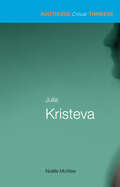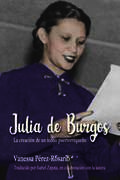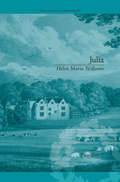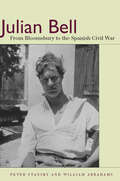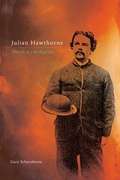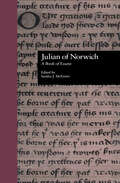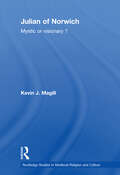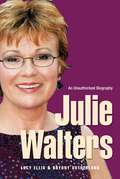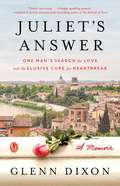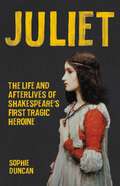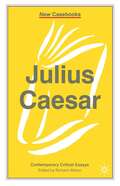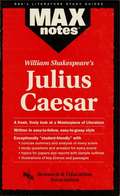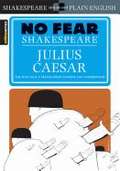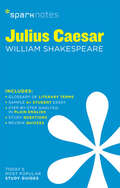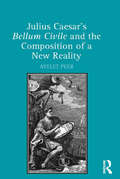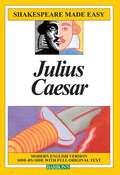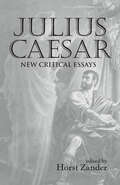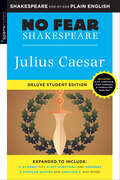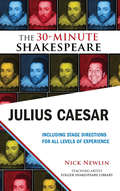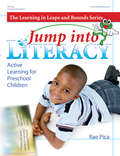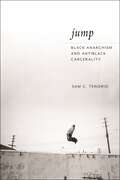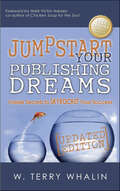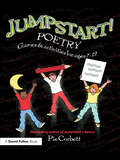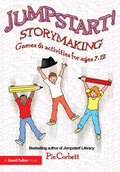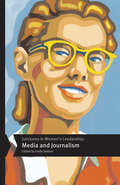- Table View
- List View
Julia Kristeva (Routledge Critical Thinkers)
by Noelle McAfeeOne of the most original thinkers of the twentieth century, Julia Kristeva has been driving forward the fields of literary and cultural studies since the 1960s. This volume is an accessible, introductory guide to the main themes of Kristeva's work, including her ideas on:*semiotics and symbolism*abjection*melancholia*feminism*revolt.McAfee provides clear explanations of the more difficult aspects of Kristeva's theories, helpfully placing her ideas in the relevant theoretical context, be it literary theory, psychoanalysis, linguistics, gender studies or philosophy, and demonstrates the impact of her critical interventions in these areas.Julia Kristeva is the essential guide for readers who are approaching the work of this challenging thinker for the first time, and provides the ideal opportunity for those with more knowledge to re-familiarise themselves with Kristeva's key terms.
Julia de Burgos: La creación de un ícono puertorriqueño
by Vanessa Perez-RosarioDurante más de cincuenta años, Julia de Burgos ha evocado sentimientos de identidad y unión entre puertorriqueños y latinxs en Estados Unidos. Vanessa Pérez-Rosario va más allá del enfoque trágico de otras biografías de Burgos para examinar la vida de la artista considerando el trasfondo de la cultura puertorriqueña y la compleja historia de la isla y la diáspora. Enfocándose en Burgos como escritora y activista, Pérez-Rosario profundiza en su desarrollo artístico, su experiencia como migrante, sus luchas contra el colonialismo y la injusticia social y sus contribuciones a la cultura literaria y visual latinoamericanas. Al mismo tiempo, desentraña las dinámicas culturales y políticas que operan en las revisiones y reinvenciones de Burgos que escritores y artistas latinxs contemporáneos en Nueva York llevan a cabo para imaginar nuevas posibilidades para sí mismos y sus comunidades. Disponible por primera vez en español, Julia de Burgos cuenta la destacada historia de la poeta y activista puertorriqueña.
Julia: by Helen Maria Williams (Chawton House Library: Women's Novels)
by Natasha DuquetteThis critical edition of Julia is the first modern printing of a novel that blends the character development of a poet with critical reflections on social injustice.
Julian Bell
by William Abrahams Peter StanskyJulian Bell explores the life of a younger member, and sole poet, of the Bloomsbury Group, the most important community of British writers and intellectuals in the twentieth century, which includes Virginia Woolf (Julian's aunt), E. M. Forster, the economist John Maynard Keynes, and the art critic Roger Fry. This biography draws upon the expanding archives on Bloomsbury to present Julian's life more completely and more personally than has been done previously. It is an intense and profound exploration of personal, sexual, intellectual, political, and literary life in England between the two world wars. Through Julian, the book provides important insights on Virginia Woolf, his mother Vanessa Bell, and other members of the Bloomsbury Group. Taking us from London to China to Spain during its civil war, the book is also the ultimately heartbreaking story of one young man's life.
Julian Hawthorne: The Life of a Prodigal Son
by Gary ScharnhorstJulian Hawthorne (1846-1934), Nathaniel Hawthorne's only son, lived a long and influential life marked by bad circumstances and worse choices. Raised among luminaries such as Thoreau, Emerson, and the Beecher family, Julian became a promising novelist in his twenties, but his writing soon devolved into mediocrity. What talent the young Hawthorne had was spent chasing across the changing literary and publishing landscapes of the period in search of a paycheck, writing everything from potboilers to ad copy. Julian was consistently short of funds because--as biographer Gary Scharnhorst is the first to reveal--he was supporting two households: his wife in one and a longtime mistress in the other. The younger Hawthorne's name and work ethic gave him influence in spite of his haphazard writing. Julian helped to found Cosmopolitan and Collier's Weekly. As a Hearst stringer, he covered some of the era's most important events: McKinley's assassination, the Galveston hurricane, and the Spanish-American War, among others. When Julian died at age 87, he had written millions of words and more than 3,000 pieces, out-publishing his father by a ratio of twenty to one. Gary Scharnhorst, after his own long career including works on Mark Twain, Oscar Wilde, and other famous writers, became fascinated by the leaps and falls of Julian Hawthorne. This biography shows why.
Julian of Norwich: A Book of Essays (Garland Medieval Casebooks #21)
by Sandra J. McEntireThese essays-written specifically for this book-provide a rich evaluation of this late 14th and early 15th-century mystical writer's book of revelations and considers the construction of her narrative, its theological complexity, and its literary and intellectual context. This casebook features discussions by both established scholars and newer voices ranging from genre to eschatology and gynecology to diabology, reflecting both current and comparative theory. Providing translations of all Middle English quotations, the volume includes a selective bibliography that provides a guide for further reading.
Julian of Norwich: Mystic or Visionary? (Routledge Studies in Medieval Religion and Culture)
by Kevin MagillJulian of Norwich was a fourteenth-century woman who at the age of thirty had a series of vivid visions centred around the crucified Christ. Twenty years later, while living as an anchoress in a church, she is believed to have set out these visions in a text called the Showing of Love. Going against the current trend to place Julian in the category of mystic - a classification which defines her visions as deeply private, psychological events - this book sets Julian’s thinking in the context of a visionary project used to instruct the Christian community. Drawing on recent developments in philosophy that debate the objectivity and rationality of vision and perception, Kevin J. Magill gives full attention to the depth and richness of the visual language and modes of perception in the Showing of Love. In particular, the book focuses on the ways in which Julian presented her vision to the Christian society around her, demonstrating the educative potential of interaction between the ‘isolated’ anchoress and the wider community. Challenging Julian’s identification as a mystic and solitary female writer, this book argues that Julian engaged in a variety of educative methods – oral, visual, conversational, mnemonic, alliterative – that extend the usefulness of her text.
Julie Walters: Seriously Funny - An Unauthorised Biography
by Lucy Ellis Bryony SutherlandFrom her BAFTA-winning television work, such as My Beautiful Son, to her big screen debut alongside Michael Caine in Educating Rita, her starring in Billy Elliot (both of which earned her Oscar nominations) and her portrayal of Mrs Weasley in the Harry Potter films, Julie Walters has worked with some of the greatest and most diverse actors and directors in the world today. In December 2005, at the British Comedy Awards, Walters - alongside longtime friend and television comedy partner Victoria Wood - picked up the Outstanding Contribution to Comedy Award.Raised in a strict Catholic family in working class Birmingham, Julie Walters abandoned a nursing course to study drama at Manchester Polytechnic and went on to join the Liverpool Everyman Theatre where she cut her teeth as an actress. Over the next decade, she experienced three marriage proposals, two long-term romances and a period of heavy drinking. At the end of 1984 she met sociology student Grant Roffey and had a daughter Maisie, who was traically diagnosed with luekaemia and had to undergo years of painful chemotherapy.the authors have interviewed friends, teachers and colleagues to skilfully compile the first-ever biography of one of Britain's finest and best-loved actresses.
Juliet's Answer: One Man's Search for Love and the Elusive Cure for Heartbreak
by Glenn DixonEat, Pray, Love meets The Rosie Project in this fresh, heartwarming memoir by a man who travels to Verona and volunteers to answer letters addressed to Shakespeare’s Juliet, all in an attempt to heal his own heartbreak.When Glenn Dixon is spurned by love, he packs his bags for Verona, Italy. Once there, he volunteers to answer the thousands of letters that arrive addressed to Juliet—letters sent from lovelorn people all over the world to Juliet’s hometown; people who long to understand the mysteries of the human heart. Glenn’s journey takes him deep into the charming community of Verona, where he becomes involved in unraveling the truth behind Romeo and Juliet. Did these star-crossed lovers actually exist? Why have they remained at the forefront of hearts and minds for centuries? And what can they teach us about love? When Glenn returns home to Canada and resumes his duties as an English teacher, he undertakes a lively reading of Romeo and Juliet with his students, engaging them in passions past and present. But in an intriguing reversal of fate and fortune, his students—along with an old friend—instruct the teacher on the true meaning of love, loss, and moving on. An enthralling tale of modern-day love steeped in the romantic traditions of eras past, this is a memoir that will warm your heart.
Juliet: The Life and Afterlives of Shakespeare's First Tragic Heroine
by Sophie DuncanThe enduring cultural legacy of Shakespeare&’s Juliet Capulet — a history "as vital and provocative as the character herself" (Literary Review).Romeo and Juliet may be the greatest love story ever told, but who is Juliet? Demure ingénue? Or dangerous Mediterranean madwoman? From tearstained copies of the First Folio to Civil War-era fanfiction, Shakespeare&’s star-crossed heroine has long captured our collective imagination. Juliet is her story, traced across continents through four centuries of history, theatre, and film. As Oxford Shakespeare scholar Sophie Duncan reveals, Juliet&’s legacy stretches beyond her literary lifespan into a cultural afterlife ranging from enslaved African girls in the British Caribbean to the real-life Juliets of sectarian violence in Bosnia and Belfast. She argues that our dangerous obsession with the beautiful dead teenager and Juliet&’s meteoric rise as a defiant sexual icon have come to define the Western ideal of romance. Wry and inventive, Juliet is a tribute to fiction&’s most famous teenage girl who died young, but who lives forever.
Julius Caesar
by Richard WilsonJulius Caesar: A New Casebook provides students and academics with a selection of important essays by leading contemporary critics on Shakespeare's first "Globe" play. New historicist, feminist, psychoanalytic and Marxist readings of the tragedy have been chosen to highlight the urgency with which this drama of prophecy, interpretation and political crisis speaks to twenty-first century concerns about democracy, the media and mass communication.
Julius Caesar (MAXNotes Literature Guides)
by Joseph ScaliaREA's MAXnotes for William Shakespeare's Julius Caesar The MAXnotes offers a comprehensive summary and analysis of Julius Caesar and a biography of William Shakespeare. Places the events of the play in historical context and discusses each act in detail. Includes study questions and answers along with topics for papers and sample outlines.
Julius Caesar (No Fear Shakespeare)
by William Shakespeare SparkNotes StaffNo Fear Shakespeare gives you the complete text of Julius Caesar on the left-hand page, side-by-side with an easy-to-understand translation on the right. <p><p> Each No Fear Shakespeare contains <p> The complete text of the original play <p> A line-by-line translation that puts Shakespeare into everyday language <p> A complete list of characters with descriptions <p> Plenty of helpful commentary
Julius Caesar SparkNotes Literature Guide (SparkNotes Literature Guide Series #38)
by SparkNotesJulius Caesar SparkNotes Literature Guide by William Shakespeare Making the reading experience fun! When a paper is due, and dreaded exams loom, here's the lit-crit help students need to succeed! SparkNotes Literature Guides make studying smarter, better, and faster. They provide chapter-by-chapter analysis; explanations of key themes, motifs, and symbols; a review quiz; and essay topics. Lively and accessible, SparkNotes is perfect for late-night studying and paper writing. Includes:An A+ Essay—an actual literary essay written about the Spark-ed book—to show students how a paper should be written.16 pages devoted to writing a literary essay including: a glossary of literary termsStep-by-step tutoring on how to write a literary essayA feature on how not to plagiarize
Julius Caesar's Bellum Civile and the Composition of a New Reality
by Ayelet PeerIn his Commentarii de Bello Civili Julius Caesar sought to re-invent his image and appear before his present and future readers in a way which he could control and at times manipulate. Offering a new interpretation of the Bellum Civile this book reveals the intricate literary world that Caesar creates using sophisticated techniques such as a studied choice of vocabulary, rearrangement of events, use of indirect speech, and more. Each of the three books of the work is examined independently to set out the gradual transformation of Caesar's literary persona, in step with his ascent in the 'real' world. By analysing the work from Caesar's viewpoint the author argues that by adroit presentation and manipulation of historical circumstances Caesar creates in his narrative a different reality, one in which his conduct is justified. The question of the res publica is also a key point of the volume, as it is in the Bellum Civile, and the author argues that Caesar purposely does not present himself as a Republican, contrary to commonly held views. Employing detailed philological analyses of Caesar's three books on the Civil War, this work significantly advances our understanding of Caesar as author and politician.
Julius Caesar: Modern English Version Side-by-side With Full Original Text (Shakespeare Made Easy)
by William Shakespeare Alan DurbandHere are the books that help teach Shakespeare plays without the teacher constantly needing to explain and define Elizabethan terms, slang, and other ways of expression that are different from our own. Each play is presented with Shakespeare's original lines on each left-hand page, and a modern, easy-to-understand "translation" on the facing right-hand page. All dramas are complete, with every original Shakespearian line, and a full-length modern rendition of the text. These invaluable teaching-study guides also include: Helpful background information that puts each play in its historical perspective. Discussion questions that teachers can use to spark student class participation, and which students can use as springboards for their own themes and term papers. Fact quizzes, sample examinations, and other features that improve student comprehension of what each play is about.
Julius Caesar: New Critical Essays (Shakespeare Criticism #Vol. 29)
by Horst ZanderThis book explores traditional approaches to the play, which includes an examination of the play in light of current history, in the context of Renaissance England, and in relation to Shakespeare's other Roman plays as well as structural examination of plot, language, character, and source material. Julius Caesar: Critical Essays also examines the current debates concerning the play in Marxist, psychoanalytic, deconstructive, queer, and gender contexts.
Julius Caesar: No Fear Shakespeare Deluxe Student Editions - Shakespeare Side-by-Side Plain English (No Fear Shakespeare)
by William Shakespeare SparkNotesShakespeare everyone can understand—now in this new EXPANDED edition of JULIUS CAESAR! Why fear Shakespeare? By placing the words of the original play next to line-by-line translations in plain English, this popular guide makes Shakespeare accessible to everyone. And now it features expanded literature guide sections that help students study smarter. The expanded sections include: Five Key Questions: Five frequently asked questions about major moments and characters in the play. What Does the Ending Mean?: Is the ending sad, celebratory, ironic . . . or ambivalent? Plot Analysis: What is the play about? How is the story told, and what are the main themes? Why do the characters behave as they do? Study Questions: Questions that guide students as they study for a test or write a paper. Quotes by Theme: Quotes organized by Shakespeare&’s main themes, such as love, death, tyranny, honor, and fate. Quotes by Character: Quotes organized by the play&’s main characters, along with interpretations of their meaning.
Julius Caesar: The 30-Minute Shakespeare
by Nick NewlinJulius Caesar: The 30-Minute Shakespeare presents eight spellbinding scenes from this timeless masterpiece. The action begins as the soothsayer warns Caesar of the Ides of March and continues as Brutus conspires against Caesar. Other key scenes include Caesar's riveting assassination and Antony's stirring funeral oration. This adaptation closes with Cinna the Poet's death at the hands of the mob, the quarrel between Brutus and Cassius, and Brutus' suicide. The edition includes a preface by Nick Newlin containing helpful advice on presenting Shakespeare in a high school setting with novice actors, as well as an appendix with play-specific suggestions and recommendations for further resources.
Jump Into Literacy: Active Learning for Preschool Children
by Rae PicaJump into Literacy combines children's love of active games with over 100 lively literacy activities. Written by a well-known children's movement specialist, these joyful games will engage the whole child in moving and playing as a way to develop the literacy skills needed for reading and writing. Each activity is complete with a literacy objective, a materials list, instructions, and extension activities. Most of the activities include suggestions for related music and children's books. From "The Alphabet in Action" to "Floorwriting" and "Follow That Letter," the activities in Jump into Literacy bring active learning to the classroom!
Jump: Black Anarchism and Antiblack Carcerality
by Sam C. TenorioAsks how we can better understand a politics of refusalWriting a new story of Black politics, Jump emerges from the practice of enslaved Africans jumping overboard off their slavers’ ships. Reading against the narrative that depoliticizes and denigrates the leaps of the enslaved as merely suicidal symptoms of chattel slavery and the Middle Passage, Sam C. Tenorio demonstrates how bringing these jumps to bear on the foundations of Black politics allows us to rethink a politics of refusal.In a period of increasing political mobilization against police brutality and mass incarceration, Jump attends to the layers of confinement that constitute the racial and gendered hierarchies of the antiblack world. Centering radical acts too often relegated to the periphery of Black politics, Tenorio proposes a Black anarchist politics of refusal that helps us to think dissent anew.Tracing iterations of the jump through the carceral wake of the slave ship, Tenorio explores the voyages of the Black Star Line in defiance of the bordered authority of the nation state, the Watts Rebellion of 1965 against the property relation of ghettoization, and Assata Shakur’s abscondence from prison to Cuba. Ultimately, Tenorio argues that considering the jump as a progenitor of Black politics deepens and widens our conceptualization of the Black radical tradition and introduces a paradigm-shifting attention to Black anarchism.
Jumpstart Your Publishing Dreams: Insider Secrets to Skyrocket Your Success
by W. Terry WhalinJumpstart Your Publishing Dreams covers the essential skills for every writer to be published and uses the word “publish” in the broadest possible sense including books, online writing and printed magazine. Each chapter includes a mixture of personal storytelling from the author combined with specific and practical advice for the beginning and experienced writer. Each chapter ends with a section for the reader to Dig Deeper (learn from other resources) and Awaken Your Dreams (apply the content to their own writing).
Jumpstart! Poetry: Games and Activities for Ages 7-12 (Jumpstart)
by Pie CorbettA good poetry idea should help the children feel excited about writing and enable them to think of what to write - developing their imagination, creativity and writing skills. Jumpstart! Poetry is about involving children as creative writers through writing poems. The book contains a bank of ideas that can be drawn upon when teaching poetry but also at other times to provide a source for creative writing that children relish. There are more than 100 quick warm-ups to fire the brain into a creative mood and to ‘jumpstart’ reading, writing and performing poetry in any key stage 1 or 2 classroom. Practical, easy-to-do and vastly entertaining, this new ‘jumpstarts’ will appeal to busy teachers in any primary classroom.
Jumpstart! Storymaking: Games and Activities for Ages 7-12 (Jumpstart)
by Pie CorbettJumpstart! Storymaking is a collection of games and activities to develop the creative process of ‘storymaking’. It focuses upon 'storytelling for writing' as well as creating a whole school culture of storytelling, reading and writing. Storymaking is the process of retelling, innovating and creating new stories. Like the best-selling Jumpstart! Literacy, this book contains imaginative ‘quick-fire' ideas that could be used as creative warm-ups and starters or developed into lessons. There are over 100 provocative and thought-provoking games and activities, intended to ‘jumpstart’ storytelling, reading and writing in any Key Stage 1, 2 or 3 classroom. Practical, easy-to-do and vastly entertaining, the ‘jumpstarts’ will appeal to busy teachers.
Junctures in Women’s Leadership: Media and Journalism (Junctures: Case Studies in Women's Leadership)
by Elizabeth L. Toth Linda Steiner Nahed Eltantawy Tracy Everbach Michelle Duster Stine Eckert Amy Jordan Paromita Pain Sadie Couture Constance Mitchell Ford Kevin Blackistone Shannon Scovel Chloe TeraniThe news industry is still dominated by men. Yet women have exercised leadership in journalism and related media professions in a variety of ways, from moral leadership to experimenting with structural and technological innovations and pioneering new formats to serve new audiences. This book offers a robust account of women’s leadership in journalism, looking at what motivated women to become media leaders, the obstacles they overcame, and the strategies they used to solve problems and handle crises. This book offers profiles of inspiring women in prominent media positions from the nineteenth century to today, beginning with trailblazers like abolitionist publisher Mary Ann Shadd and Memphis Free Speech anti-lynching editor Ida B. Wells. The book takes an in-depth look at the leadership styles of well-known media moguls like Oprah Winfrey and Washington Post publisher Katharine Graham. Other chapters highlight women now emerging as media leaders, such as digital media executive S. Mitra Kalita and Iman Zawahry, a Muslim hijabi filmmaker. Bringing together cases from print, broadcast, public relations, film, and digital media, this book offers useful insights into how to be an effective leader in an ever-changing industry.
